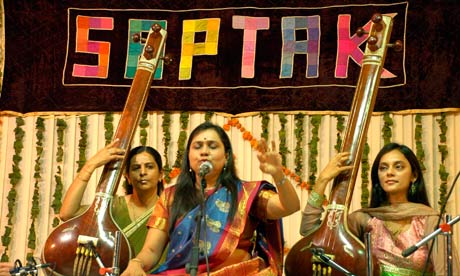
There are two types of music festival in India. There are those, such as Jodhpur's Riff, that cater for international visitors as well as a local audience, and those that are truly Indian. The latter are often spiritual events, like the Kenduli Mela, see below, in West Bengal. These are less comfortable, more crowded, but often the most memorable. Most take place in the cooler winter months, when travelling in India is more pleasant.
• In Rajasthan and catering for an international audience is the Jaipur Literature Festival (21-25 January 2011; jaipurliteraturefestival.org), which includes big name authors and an impressive music programme in the Rajasthani capital. Held at the beautiful Hotel Diggi Palace, it is programmed by historian and travel writer William Dalrymple (a big music fan) and publisher and novelist Namita Ghokale. Visiting authors in 2011 include Orhan Pamuk, JM Coetzee, Kiran Desai, Germaine Greer and Monica Ali; and although the music programme isn't confirmed yet, the last festival included Titi Robin, a group of Sufi fakirs from Pakistan, plus Susheela Raman and Sam Mills. There are readings, discussions and interviews during the day and great music in the evenings. And Jaipur is only three or four hours' drive from Delhi.
• The biggest festival of Indian classical music is probably Chennai's Madras Music Season, which runs from mid-December to mid-January, and the oldest is Harivallabh Sangeet Sammelan, which started in 1875 in Jalandhar in the Punjab. But more intimate, passionate and friendly is the Saptak festival (1-13 January 2011; saptak.org/welcome.php) in Ahmedabad, Gujurat. Running since 1980, it attracts some of India's top musicians.
It's very egalitarian: everyone sits on mattresses on the floor in a hall, with top musicians sitting next to fans. What makes it really special is that the big names tend to hang around for a few days and sit in to watch other musicians play, which means the recitals are excellent, because the stars are performing to their peers so the atmosphere is relaxed and un-stuffy. Each evening begins with younger players and builds up to the stars, including, this year, Amjad Ali Khan (sarod), Rahul Sharma (santoor) and Shahid Parvez (sitar). Some of the best recent recordings of Indian classical music (by Sense World Music) have been made there.
• But for a taste of musical and devotional India at its craziest, head for the Kenduli Mela (14-16 January 2011). The festival of Baul mystics and troubadours is the largest gathering of singers and tantrics in south Asia. The Bauls are musician philosophers – central to Bengali culture – singing of desire and devotion, ecstasy and madness. On the flood plain of the river Ajoy, north of Kolkata, they have been gathering with their one-string ektaras and their drums for more than 500 years. For three nights they light fires, prepare food, smoke ganja around the Baul monastery of Tamala-tala, and sing and dance through the night until dawn.
Simon Broughton is editor-in-chief of Songlines Magazine (songlines.co.uk)

